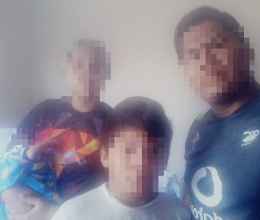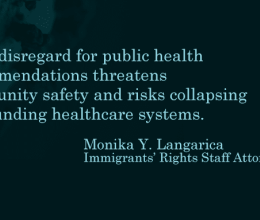SAN DIEGO - Customs and Border Protection is regularly withholding constitutional protections to U.S. citizens and non-citizens alike who are arrested at the U.S.-Mexico border, charged the ACLU of San Diego & Imperial Counties and the ACLU’s Criminal Law Reform Project in a letter sent this week to multiple federal officials.
CBP is routinely holding arrestees in custody for five days or longer before they are presented to a magistrate judge; holding them incommunicado; not informing them of the charges against them; not allowing them to seek assistance of counsel; and not advising them of their post-arrest rights. CBP has also held detainees in particularly harsh conditions, cramming them into small rooms and forcing them to sleep on hard floors or benches without a blanket, and denying them bathing and shower facilities, personal hygiene items, sufficient nutrition and proper medical care.
“There is simply no justification for denying people basic due process rights and humane treatment,” said Sean Riordan, staff attorney for the ACLU of San Diego & Imperial Counties. “The mistreatment in these CBP hold rooms is deeply troubling. Even worse are the delays in appearing before a judge, the incommunicado detention, and the appalling conditions. Our society committed to abandoning these ugly, dungeon-like practices centuries ago, but they’ve sadly found new life today. It’s time for the government to treat detainees as the Constitution proscribes.”
The demand letter requests the government to comply with the law by:
- Presenting arrestees before a judicial figure within a legally reasonable time (typically within 48 hours of arrest);
- Allowing arrestees to communicate with counsel and family members; and
- Improving the conditions of detention for arrestees, including beds, meals and medical care.
The ACLU has documented information that routine delays of five to eleven days between the time of the CBP’s warrantless arrest and the arrestee’s initial appearance before a judge. During this delay, arrestees are held in miserable conditions, including:
- Dozens of detainees jammed into small, often frigid rooms not designed for overnight detention;
- Having to sleep for days on metal benches, hard concrete or tile floors with no mattresses, blankets or pillows;
- Having only two meals per day;
- Not having access to bathing facilities or hygiene items such as soap, change of clothes, toothbrush or toothpaste; and
- Receiving no screening for existing serious medical conditions or illnesses, including those requiring medication and monitoring, such as diabetes, epilepsy, schizophrenia and heart disease.
“Beyond the appalling conditions is what seems to be a government scheme to coerce arrestees into making incriminating statements or confessions” said Riordan. In one case, a mother of two teenagers was pressured to confess by being told that she would sit in the tiny cell with nothing but a toilet “for about four or five days” without being able to call her children or anyone else.
The ACLU seeks to resolve the issue without litigation, but may be forced to file suit to enforce the rights of arrestees who have been or will be harmed by the length, manner and conditions of their detention.








